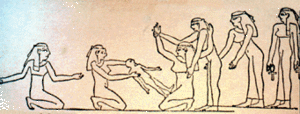In Focus: Jewish Midwives
The Passover story is most often associated with the leadership of Moses, but in fact the cycle of protest that culminated in the exodus from Egypt began with the courageous acts of two women who disobeyed Pharaoh’s decree to murder all Hebrew male babies born in Egypt. These women, Shifra and Puah, practiced a bold and noteworthy profession—midwifery. It was their commitment to preserving human life and their skills as midwives that provided the safe and secret delivery of Hebrew children.
It is significant that the Biblical text actually mentions Shifra and Puah by name, suggesting the ultimate importance of their role in the liberation of the Israelites. The Talmudic sages taught that the names “Shifra” and “Puah” indicate different roles midwives play. “Shifra” stems from the Hebrew verb to swaddle or to clean a baby, while Puah comes from the Hebrew word to cry out because a midwife tries to calm a new mother’s cries by offering her words of encouragement. For centuries, women practiced the art and skill of midwifery in the Middle East, Europe, and America. In this feature, the legacies of Shifra and Puah will be traced through the stories of American Jewish women who practiced midwifery at the turn of the 20th Century.
Discover the invaluable contributions of midwives Hannah Sandusky, Rose Fineberg and Lena Barber to the American cities of Pittsburgh and Baltimore. Read Alice Bailes' first hand account on why she values her career as a Jewish midwife in Alexandria, Virginia.
Help spread the story of Passover by sharing your stories of Jewish midwives!




I just discovered that 3 of my great great grandmother's children were delivered by the same midwife over a 10-year span in the late 1800s in the tenements of the Lower East Side in NYC. This seemingly small detail has taken my breath away. I am trying my hardest to find out as much as I can about the midwife, Josephina Muhlstein, as I can. I want to honor her memory along with my great great grandmother, as I imagine their bond must have been a strong and important one. If anyone who comes across this comment has any information on Josephina, I would love to talk to you! The only thing I can really find is a 1900 census that she is on. Thank you!
My great grandmother Genendel Liba Hammer (Schindler/Elbogen) was a widow in Hungary who became a midwife with the blessing of a rabbi (whom she turned to for advice on what to do for a living when her hubby died). He gave her his "gartel", a Hassidic belt, to use. Her claim to fame was that she never lost a child or mother. She subsequently married twice more and moved to Israel when she was already way in her 80s. She is buried in Jerusalem.
My great grandmother, Gitla Sztejrin, was a Russian Jewish midwife in the early 1900's. My grandfather had told my father that he remembered the day when someone from the Czar's palace arrived on horseback to deliver a special document from the Czarina to Gitla which was an official "permission" for the practice of midwifery. What was the reason for this? Would you believe that Jewish midwives had to have "royal permission" to help gentile women deliver their babies?